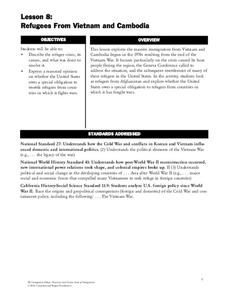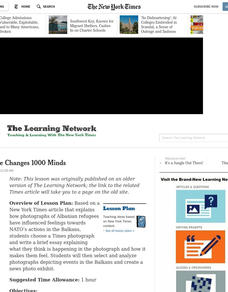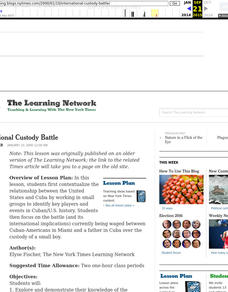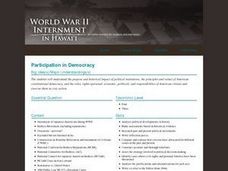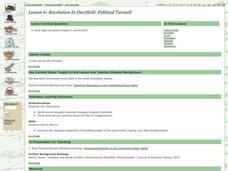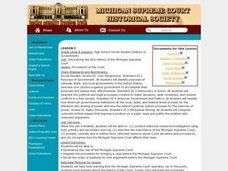EngageNY
Mid-Unit Assessment: On-Demand Writing – Conflicting Interpretations of the 13th and 14th Amendments
The authors of the court's decision and the dissenting opinion on Plessy v. Ferguson disagreed on their interpretations of the Thirteenth and Fourteenth Amendments. Scholars set out to show how with an on-demand writing prompt. They...
Curated OER
Understanding Causes of Global Conflict: Peer Interviews
Students examine sources of conflict. In this global conflict lesson plan, students discuss how peer pressure, bias, oppression, ethnocentrism, miscommunication, and fear contribute to personal conflict as well as global conflict....
Curated OER
History Lesson Plan: The Israeli-Palestinian Conflict
Students explore the Israeli-Palestinian conflict. In this Middle Eastern history lesson, students discover the ancient and contemporary history of Palestine in a lecture format. Students research primary and secondary sources regarding...
Constitutional Rights Foundation
Refugees From Vietnam and Cambodia
The United States may have pulled its troops from the Vietnam War in 1973, but the conflict was far from over for the citizens living in Asia at the time. An informative resource lets learners know about the wave of over 220,000...
Curated OER
Conflict and Compromise
Young scholars examine opinions about the Boston Tea Party. In this colonial America lesson plan, students analyze several primary sources about the Tea Party and then write essays that reveal efforts to compromise as well as efforts to...
Curated OER
Why A Bill of Rights?
Examine conflicting viewpoints in this lesson, in which middle schoolers write their own proposal for including a Bill of Rights in the Constitution. As a class, they discover how the Bill of Rights was not a planned document to be...
University of California
The Vietnam War (1945 – 1975)
Have you ever wanted to do something so perfectly you wound up not doing it well at all? Young historians use primary and secondary documents to analyze the United States involvement in the Vietnam War. The issues surrounding the...
Curated OER
The Uncertain Future of Kosovo
Students investigate the ongoing peace process in Kosovo through thorough discussion of the underlying issues of the Kosovo conflict and the evolving resolution.
Curated OER
A Picture Changes 1000 Minds
Students choose a Times photograph and write a brief essay explaining what they think is happening in the photograph and how it makes them feel. They select and analyze photographs depicting events in the Balkans and create a news photo...
Curated OER
"I Hear America Singing": Controversy and Music in the Mexican War
Eighth graders examine the Mexican War and its outcome through music. In this primary source analysis lesson, 8th graders analyze the lyrics of selected songs to consider the 2 perspectives regarding U.S. involvement in the war. Students...
Curated OER
Genetically-Modified Food
Students investigate the pros and cons of genetic engineering. They watch a short Bill Moyers video, conduct Internet research, create a poster, participate in a pro/con debate, and write an essay expressing their personal feelings on...
Curated OER
Inherit the Wind
Young scholars explore the theory of evolution and read the play Inherit The Wind and a series of articles and essays about the famous Scopes trial that centered around the right to teach evolution. They incorporate technology as they...
Curated OER
Seeking Civil Rights
Students explore the impact of the Plessy v. Ferguson case. In this social justice lesson, students examine the case, Jim Crow laws, and non-violent forms of protest. Students write essays to persuade the government regarding unjust laws.
Curated OER
Interpreting Political Cartoons
Students review political cartoons and discuss what political impact they can have. They choose a current political cartoon and write an essay exploring its intent and impact.
Curated OER
Economy Or Environment: Which Comes First?
Students compile a portfolio of work from a unit on Maine's natural resources and economy. They choose four of their best assignments from the unit then synthesize the ideas in each to write an essay or construct a visual history on the...
Curated OER
Bernardo de G??lvez: Supporter of the American Revolution
Eighth graders explore the assistance to the American Revolution provided by Spain. Through class discussion and research, they gather information about Bernardo de Galvez and his role during the Revolutionary War. Students synthesize...
San Bernardino Co. Supt. of Schools
Was Julius Caesar a Good Leader for Rome?
Learners consider the various perspectives that different groups in Roman society may have had for Julius Caesar, such as Roman soldiers, senators, the working class, and slaves. The primary activity involves a reading of Caesar's...
Curated OER
What is Framing?
Young scholars practice framing issues. In this writing skills lesson, students participate in a classroom activity that requires them to look at specific topical issues by framing them. Young scholars then create collages on current...
Curated OER
International Custody Battle
Students research the relationship between the United States and Cuba by identifying key players and events in Cuban/U.S. history. They also focus on a battle waged between Cuban-Americans in Miami and a father in Cuba over the custody...
Curated OER
Immigration in the United States
High schoolers explore how recent immigration and migration patterns impact social and political issues. They apply affective learning techniques
Curated OER
Participating in Democracy
Students analyze film clips in class. In this democracy lesson, students identify the differences between civil liberties, democracy and freedom. Students view a video regarding Japanese internment and answer study questions as well as...
Curated OER
Revolution in Deerfield: Political Turmoil
Eleventh graders explore loyalism and rebellion in revolutionary era Connecticut River Valley.
Curated OER
Procedures of the Court
Students examine the role of the Michigan Supreme Court. They diagram the procedure one must follow to bring a case before the Court. They discuss the order of business for oral arguments as well.



